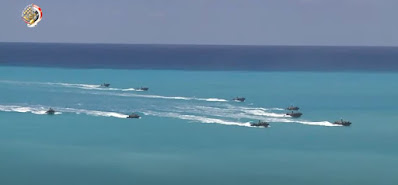On Saturday, July 3rd, the Egyptian President Abdel Fattah El-Sisi launched the long-anticipated naval base in Gargoub Port. The giant base, which is located at Egypt’s northwestern coast in the Mediterranean, is named “The 3rd of July” in honor of the anniversary of removing the Muslim Brotherhood regime from power, in 2013. The opening ceremony of the new naval base was concluded by performing “Kader 2021” exercises to showcase the advanced equipment and high level of professionalism accomplished by the Egyptian naval forces, over the past few years.
Gragoub’s “3rd of July” base is the third naval base, and the fourth military base, to be built during the past five years, within the scope of a sustained process to rebuild the capacity of the Egyptian armed forces, especially the naval fleet. In addition to the new base in Gargoub, there is Ras Banas naval base, southern the Red Sea, the central naval base in Port Said at the northeastern of Suez Canal, and Mohamed Naguib military base in Marsa Matrouh. Mohamed Naguib base, which started operation in July 2017, is the biggest military base of its kind in Africa and the Middle East.
The Egyptian navy is ranked the 7th strongest naval fleet in the world, according to Global Firepower index for the year 2021. A huge effort has been exerted, under the leadership of President El-Sisi, to get the Egyptian navy to this advanced ranking. The difficult journey to refurbish the Egyptian naval forces started in January 2017, by splitting the Egyptian navy into two fleets: south fleet at the Red Sea and north fleet at the Mediterranean. Both fleets are designed to deter potential threats arising from the growing geopolitical conflicts in the eastern Mediterranean and the Horn of Africa. They also enhance Egypt’s economic profile as a logistical hub between Europe, Africa, and Asia, due to the new discoveries of gas in the Mediterranean and the importance of the Suez Canal route for international trading.
To put things into perspective, let’s compare the advanced arms and equipment that the Egyptian navy owns today to what it had a decade ago. In 2011, Egypt barely owned a handful number of Chinese submarines procured in the 1980s and a few frigates recycled by the US navy, that Egypt bought in the 1990s. Now, in 2021, Egypt has become one of a few countries, worldwide, that own Mistral helicopter carriers, GoWind corvettes, Italian and French made FREMM frigates, and advanced submarines Type-209/1400mod. On Saturday, at the Gargoub base opening ceremony, President El-Sisi raised the Egyptian flag on new 47 naval vessels, marking their entry into the Egyptian armed forces. In addition, the factories affiliated to the Egyptian navy has been cooperating with French and German shipbuilding companies, since 2019, to transfer technology and locally manufacture frigates and other naval equipment.
The capacity building process of the Egyptian naval forces is not only limited to improving the armament level of the fleet. Educating and training personnel on the latest world trends of naval technology has also been a priority. Since 2019, the Egyptian navy got involved into an unprecedented number of regional and international military exercises. The majority of these joint exercises were carried out in the Mediterranean and the Red Sea. But, also, a good number of them took place in none-Egyptian waters. For example, currently, the Egyptian navy personnel are participating in the “Sea Breeze 2021” drills in the Black Sea, with other 32 countries, under the supervision of the U.S. Sixth Fleet. By the way, this is the first military exercise ever, wherein the Egyptian, Emirati, and Turkish forces meet and work together. That means a lot to the Middle East.
The geographic location of the new naval base in Gargoub, the timing of its inauguration, the top Arab officials invited to the opening ceremony, and the scenario of the Kader-21 exercises carry a number of messages by Egypt, not only to the Egyptian people, but also to regional and international rivals and friends. All these message fall under one title; that is: Egypt is the new master of the two seas and the future of the region falls in Egypt’s capable hands.
